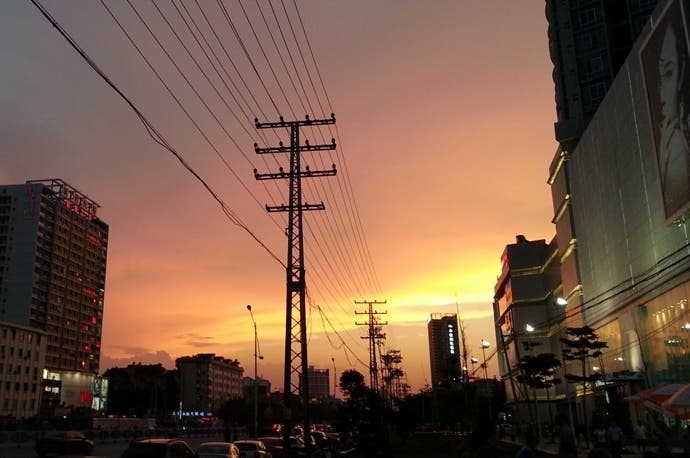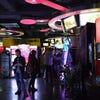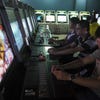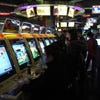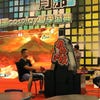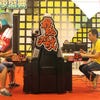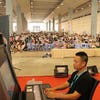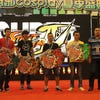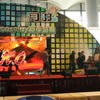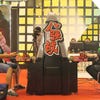Democratic gaming in the People's Republic of China
Seeing red.
Times are changing, Dylan used to sing, and nowhere more prominently than in the burgeoning People's Republic of China. Once slave to idealistic convention and crippled by economic famine, Deng Xiaoping's audacious reforms have seen the country achieve the world's second-largest economy in little more than three-decades.
But what of the Iron Fist, the hammer and sickle?
While one may not empathise with the policies of a foreign government, taking the unconstructive machinations of western news media as gospel only saddles us with tainted views. To fall back on a Chinese proverb, experience is the mother of wisdom.
Dubbed the Green City thanks to abundant tropical foliage, beautiful canopies and clawing palm trees, Nanning, capital of the Guangxi province, is a picture of economic boom time in a developing country. The gap between super-rich and struggling poor is widening at familiarly capitalistic rate. Currently upside-down with a new subway installation, signs of progress are pervasive.
Peddlers and livestock run amok in one street, Louis Vuitton in the other. Roads once dominated by cyclists are usurped by Chevrolets, Nissans and Range Rovers; and the city border - a tide of residential high-rises and financial centres - is expanding at a velocity to make SimCity pros weak at the knees.
Visitors for the Animation Summer Festival, a weekend of cosplaying and gaming, ritualistically fondle smartphones as they wrap the Expo centre's exterior in an Anime-styled human obi. Inside, the main hall is an undulation of gleaming wigs and flash photography, with corridors claimed for makeup application and costume fittings. Unwittingly, I came cosplaying as a Caucasian, receiving almost as many photo requests as the stockinged nurse in six-inch stilettos.
Booths cut parallel paths across the floor, leading to an impressive stage at one end and a gaming section at the other. No different from cosplay conventions the world over, bar perhaps the exemplary execution of the attire, it's a mish-mash of Anime-related wares, foodstuffs, and a weekend of live performances.
The teenage majority are an insight into China's rapidly changing face, an expression of modernity and independent thinking. Notions of prudishness are dashed as parents mingle with mini-skirted maids and breakneck cleavages. Lining up to sing Japanese songs and wolf katsu curry, they're also seemingly apathetic about the Daiouyu islands spat. 28 year-old researcher and One Piece disciple Xiao Ye, offers further insight:
***
Eurogamer: The scale of today's expo is remarkable. Is it normal to have such an impressive turnout?
Xiao Ye: This expo is part of what we call ACG culture: Animation, Comics and Games. It's been running for six years now, and we have two events each year, one in the summer and one in the winter. It gets bigger every year, with more and more visitors.
Eurogamer: China's relationship with Japan is historically tense, and presently so over the Daiouyu/Senkaku islands dispute. How do young Chinese relate to these issues while remaining so invested in Japanese fandom?
Xiao Ye: It's something we talk about a lot actually. When it comes to Anime and gaming, we love the culture and the scene, so we separate our hobby from the politics. We all know the history and the reasons for the difficult relationship between China and Japan. But we're positive, we want to be friends... We hope we can be friends! I don't know how Japanese people feel about us, but when it comes to celebrating Anime and gaming, I really hope we can all enjoy it together.
Eurogamer: I saw an impressive Ada Wong in the Cosplay crowd. How popular is video gaming in China today?
Xiao Ye: Games are huge, even larger than the Anime scene. Online gaming is probably the most popular form, and many people are here Cosplaying characters from a Chinese MMO set in the Tang Dynasty. I'd like to spend more time with online games, but if I start I won't be able to stop.
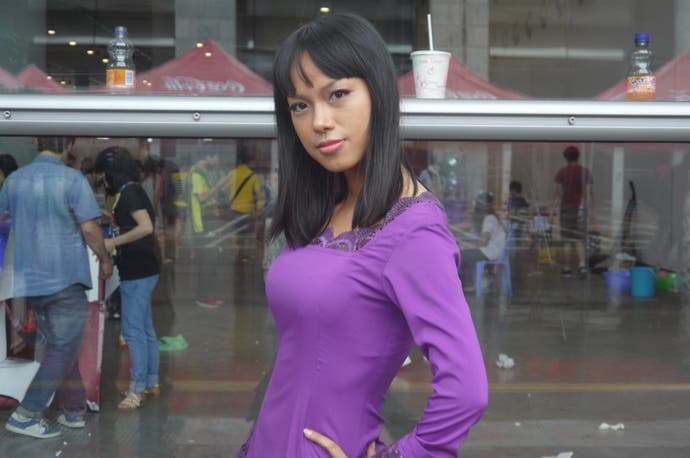
In addition to booths housing various consoles, and to my antipathy, Fruit Ninja on Kinect, the game hub is buzzing. Attendees too impatient to queue dress the outskirts with multiplayer Nintendo 3DS engagements, while Reflec Beat - Konami's popular rhythm arcade game - is mastered by a 14 year-old girl with superhero reflexes. Elsewhere, the latest Bishi Bashi smack-a-thon is distracting a mob of kids from Super Street Fighter 4: Arcade Edition, which sits centre stage on two head-to-head Vewlix cabinets.
With China regulars Da Kou and eminent Cammy player Xiao Hai successfully qualifying for this year's EVO, local candidates have come to put a fine point on who's best of the rest. Set against a cinema-sized screen, it's an afternoon of deadly sharp SSF4. Playing a taut Ryu, Nanning's own Li Fan eventually wins first place against Guilin's Xiao Zhan, earning a cash prize courtesy of the arcade chain that hosted the region's Road to EVO heats. Li Fan tells us he only made it to the second round qualifiers for the Vegas finals, so this is welcome recompense.
One wonders, while queuing for the restroom with the cast of Attack on Titan, where the training ground is for China's gaming enthusiasts. 27 year-old Luo Yi, Guangxi's top SF4 player and regular tournament MC, offers to show me the hotspots and talk candidly about the country's changing culture. We take a whirlwind tour of the city centre and five major arcades within a one-mile radius. Housing the latest machines and no expense spared conveniences, Hot Game Club offers a chill-out lounge, free Wi-Fi, and an enormous range of top-tier titles, from Darius Burst to Initial D Arcade Stage 7. With most machines costing as little as one Yuan a go (approximately ten English pence) it's an easy way to kill a few weeks.
We settle in Luo Yi's principal hangout, a neon-lit, two-floor locale known as Mario - named in honour of some fat plumber, as I understand. The ground floor is a maze of deluxe cabinets and rhythm games blasting K-Pop at dancing duos and inquisitive onlookers, while upstairs plays host to a fighting game grid of Sega candy cabinets and Taito Vewlix lanes.
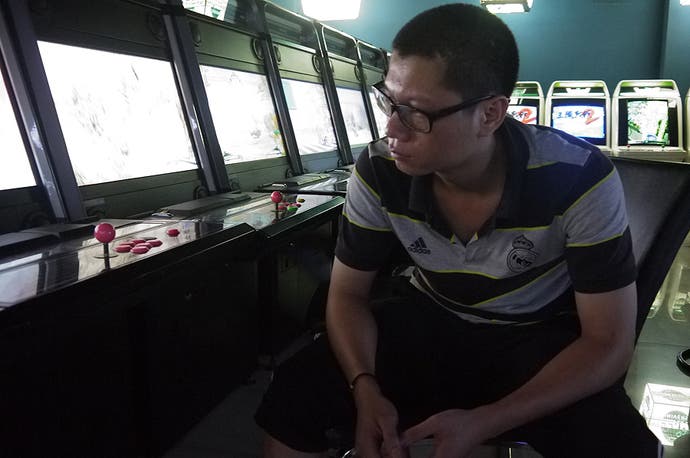
Eurogamer: So you're Guangxi's best Street Fighter IV player?
Luo Yi: Yes, I think so. I've been playing SF4 for three years now, but I only play around ten hours a week these days, so I'm probably a little rusty. I'm no Xiao Hai.
Eurogamer: Who's your weapon of choice, and why?
Luo Yi: Always Ken. He's so handsome! (laughs). I play Gouken sometimes when I want a change, but Ken is my main character. I've won about thirteen local tournaments with him.
Eurogamer: Do you practice at home?
Luo Yi: Always in the arcade. China has a poor home internet service, so for good online gaming we go to cafés and play MMOs: Starcraft, League of Legends and World of Warcraft. I don't like Chinese MMOs because there's too much emphasis on buying weaponry.
Eurogamer: What's popular in China's arcade scene?
Luo Yi: Younger generations adore music games and Initial D, but King of Fighter's '97 and '98 are still the most widely played arcade games in China. We got KOF13 too, but it didn't really catch on.
Eurogamer: In the West the arcade is officially dead. Why do you think it remains so successful in China?
Luo Yi: Community and communication. You can play face to face. Sometimes we meet female players too, so it's a great social environment! Chinese people don't like to stay at home and work all the time, so we go to the arcade to unwind, play, and afterwards drink beer. Also, game centre owners are smart with their businesses: they run monthly tournaments for all the popular genres.
Eurogamer: Console manufacturers still don't see China as a viable commercial market. Does this make home gaming unpopular?
Luo Yi: Not at all. Xboxes, PS3's, and handheld machines are all very common here. The problem is piracy. When China was closed to the rest of the world we couldn't get foreign entertainment or goods, so piracy was the only option. Now the West won't sell us things because of piracy, so piracy continues. But as China becomes richer, piracy is becoming less and less necessary. I think things will change. There's a big market for people who like to own original goods, and many new stores selling authentic games and consoles to meet demand.
Eurogamer: Wasn't there a government restriction on video games because they were considered dangerously addictive for young people?
Luo Yi: I don't remember anything like that. I don't think you can seriously restrict video games, it's just not possible. The government comes up with new schemes all the time, but there's no enforcement, so people don't pay them much attention and they get forgotten.
Eurogamer: Recent friction with Japan has seen some boycotting of their products. I assume this doesn't apply to arcade goers?
Luo Yi: No, they make great games. History is history, politics is politics. We just play Street Fighter, we're not at war (laughs).
Eurogamer: China is becoming rapidly westernised. Has this hurt traditional culture?
Luo Yi: Yes and no. Things have moved very quickly since we opened our doors, and a lot of progress has been made. In terms of affecting the culture, there are upsides and downsides, but I think being open is a good thing. It helps us reach out to the rest of the world and show them we're not like North Korea.
Eurogamer: Can you leave us with a message on behalf of Chinese gamers?
Luo Yi: Welcome to China! Please come and visit us. Let's play games, make friends, and drink beer! I'm looking forward to a new challenger.
***
The flag lingers a Communist crimson, but the reality is profoundly more colourful. Nanning's apathetic bustle and diverse blend of ethnicities is home to a people as warm as its climate. The old prefecture, buzzing with well-worn markets and beer and barbeque fuelled night streets, is reminiscent of Chun-Li's earliest backstreet brawl. The pessimist will see dirt in the cracks, the optimist a rich and enduring cultural fabric.
Sadly, the likes of McDonald's and Starbucks, who are refashioning the landscape at an alarming pace, seem to have taken the country's open door policy to mean open house. One hopes that in the West's gold rush for the East, China doesn't allow too much dilution of its traditions.
